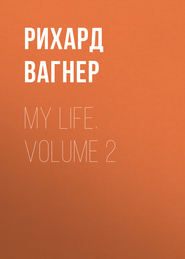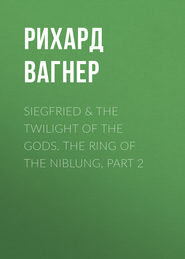По всем вопросам обращайтесь на: info@litportal.ru
(©) 2003-2025.
✖
Tristan and Isolda
Автор
Год написания книги
2019
Настройки чтения
Размер шрифта
Высота строк
Поля
Bravo, our brave Tristan!
Let his tax take who can!"
[KURVENAL, driven away by TRISTAN'S chidings, descends into the cabin. BRANGÆNA returns in discomposure to ISOLDA, closing the curtains behind her, while all the men take up the chorus and are heard without.]
KNIGHTS AND ATTENDANTS.
"His head now hangs
in Irish lands,
sole were-gild won
at English hands.
Bravo, our brave Tristan!
Let his tax take who can!"
SCENE III
[ISOLDA and BRANGÆNA alone, the curtain being again completely closed. ISOLDA rises with a gesture of despair and wrath. BRANGÆNA falls at her feet.]
BRANGÆNA. Ah! an answer
so insulting!
ISOLDA (checking herself on the brink of a fearful outburst).
How now? of Tristan?
I'd know if he denies me.
BRANGÆNA. Ah! question not!
ISOLDA. Quick, say without fear!
BRANGÆNA. With courteous phrase
he foiled my will.
ISOLDA. But when you bade him hither?
BRANGÆNA. When I had straightway
bid him come,
where'er he stood,
he said to me,
he truly served but thee,
the pearl of womanhood;
if he unheeded
left the helm
how could he pilot the ship
in surety to King Mark?
ISOLDA (bitterly).
"How could he pilot the ship
in surety to King Mark!"
And wait on him with were-gild
from Ireland's island won!
BRANGÆNA.
As I gave out the message
and in thy very words,
thus spoke his henchman Kurvenal—
ISOLDA.
Heard I not ev'ry sentence?
it all has reached my ear.
If thou hast learnt my disgrace
now hear too whence it has grown.
How scoffingly
they sing about me!
Quickly could I requite them!
What of the boat
so bare and frail,
that floated by our shore?
What of the broken
stricken man,
feebly extended there?
Isolda's art
he gladly owned;
with herbs, simples
and healing salves
the wounds from which he suffered
she nursed in skilful wise.
Though "Tantris"
The name that he took unto him,
as "Tristan"
anon Isolda knew him,
when in the sick man's keen blade
she perceived a notch had been made,
wherein did fit
a splinter broken
in Morold's head,
the mangled token
sent home in hatred rare:
this hand did find it there.
I heard a voice
from distance dim;
with the sword in hand
I came to him.
Full well I willed to slay him,
for Morold's death to pay him.
But from his sick bed
he looked up
not at the sword,
not at my arm—
his eyes on mine were fastened,
and his feebleness
softened my heart:
Let his tax take who can!"
[KURVENAL, driven away by TRISTAN'S chidings, descends into the cabin. BRANGÆNA returns in discomposure to ISOLDA, closing the curtains behind her, while all the men take up the chorus and are heard without.]
KNIGHTS AND ATTENDANTS.
"His head now hangs
in Irish lands,
sole were-gild won
at English hands.
Bravo, our brave Tristan!
Let his tax take who can!"
SCENE III
[ISOLDA and BRANGÆNA alone, the curtain being again completely closed. ISOLDA rises with a gesture of despair and wrath. BRANGÆNA falls at her feet.]
BRANGÆNA. Ah! an answer
so insulting!
ISOLDA (checking herself on the brink of a fearful outburst).
How now? of Tristan?
I'd know if he denies me.
BRANGÆNA. Ah! question not!
ISOLDA. Quick, say without fear!
BRANGÆNA. With courteous phrase
he foiled my will.
ISOLDA. But when you bade him hither?
BRANGÆNA. When I had straightway
bid him come,
where'er he stood,
he said to me,
he truly served but thee,
the pearl of womanhood;
if he unheeded
left the helm
how could he pilot the ship
in surety to King Mark?
ISOLDA (bitterly).
"How could he pilot the ship
in surety to King Mark!"
And wait on him with were-gild
from Ireland's island won!
BRANGÆNA.
As I gave out the message
and in thy very words,
thus spoke his henchman Kurvenal—
ISOLDA.
Heard I not ev'ry sentence?
it all has reached my ear.
If thou hast learnt my disgrace
now hear too whence it has grown.
How scoffingly
they sing about me!
Quickly could I requite them!
What of the boat
so bare and frail,
that floated by our shore?
What of the broken
stricken man,
feebly extended there?
Isolda's art
he gladly owned;
with herbs, simples
and healing salves
the wounds from which he suffered
she nursed in skilful wise.
Though "Tantris"
The name that he took unto him,
as "Tristan"
anon Isolda knew him,
when in the sick man's keen blade
she perceived a notch had been made,
wherein did fit
a splinter broken
in Morold's head,
the mangled token
sent home in hatred rare:
this hand did find it there.
I heard a voice
from distance dim;
with the sword in hand
I came to him.
Full well I willed to slay him,
for Morold's death to pay him.
But from his sick bed
he looked up
not at the sword,
not at my arm—
his eyes on mine were fastened,
and his feebleness
softened my heart:











